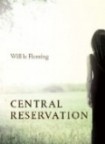Are you looking at me part III
I want you to imagine that I am staring you straight in the eye. It is a weird request, I know, but go with it. Visualise the stare. To provide inspiration, I typed ‘stare’ into flickr and this is what it gave me:
Image: flickr.com/Sarah G…
So, if you have the image, my question is this: how am I staring? Can you qualify the verb ‘staring’ with a juicy adverb – and here is the challenge – can you do so while avoiding cliché?
See, my contention is that there is no way to describe the act of staring that achieves this feat. All the adverbs that go with the verb ‘stare’ feel tired to me. When I think of staring, I think of staring ‘fixedly’. Or ‘unblinkingly’. Or ‘intently’, ‘steadily’, ‘blankly’. And every one of these feels like a cliché.
This is a matter close to my heart, since the first sentence of Central Reservation contains the word staring, as you can see over on the right there. And it used to feature the word unblinkingly, too. I wasn’t happy with it. I mulled over synonyms and came up only with the list of stale old ideas above. I tied myself thoroughly in knots. There had to be a solution, I thought, but I couldn’t find it. So I took it to my best editor, my wife, and asked her, and in return she uttered the simple words that form the first entry in Will le Fleming’s Rules of Writing: if in doubt, cut the adverb.
[If in some bizarre future I end up writing a lot of successful books and then, aka Stephen King, a book called Rules of Writing, you can say you were here at the start of it all.]
She doesn’t claim the credit for the thought, and it is probably a creative writing staple, but from her lips it seemed to drip such pure clear truth. It’s such simple, clean advice, and while there will be exceptions, it so often applies. Moreover, it lacks the terrifying self-flagellating qualities of a similar rule of Dr Johnson (and here I misquote wildly): if you come across a phrase in your writing that especially pleases you, strike it out.
I did like that rule, when I read it first, and there is something to it. If a phrase jumps out at you, the author, who knows the book so well, then it will positively leap out and smack a new reader round the chops, which can interrupt the flow somewhat.
However, there is a good deal of masochism and unnecessary aggrandisement to that saying of Johnson’s (and arguably to the man himself), which Abigail’s phrase lacks, so I am going to stick with her simpler advice. Adverbs really must add, otherwise they simply obstruct sclerotically, confuse obfuscatingly, decelerate discombobulatingly… you get the idea.

 Will le Fleming is a novelist. His debut, Central Reservation, is published by Xelsion and
Will le Fleming is a novelist. His debut, Central Reservation, is published by Xelsion and 


Leave a Reply